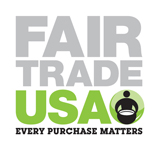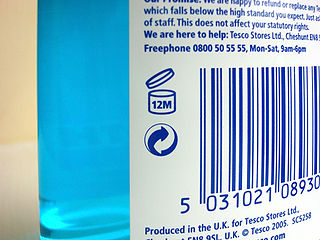 W
WEarthKosher is a kosher certification agency headquartered in Boulder, Colorado, with offices in New York and Jerusalem, providing kosher certification on a worldwide basis.
 W
WFair Trade USA, formerly "TransFair USA", is a 501(c)(3) non-profit organization that sets standards, certifies, and labels products that promote sustainable livelihoods for farmers and workers and protect the environment.
 W
WFood contact materials are materials that are intended to be in contact with food. These can be things that are quite obvious like a glass or a can for soft drinks as well as machinery in a food factory or a coffee machine.
 W
WThe International Fairtrade Certification Mark is an independent certification mark used in over 50 countries. It appears on products as an independent guarantee that a product has been produced according to Fairtrade political standards.
 W
WJapan has a system of recycling marks, recycling identification marks (リサイクル識別表示マーク), which indicate and classify recyclable materials.
 W
WThe Kitemark is a UK product and service quality trade mark which is owned and operated by the British Standards Institution.
 W
WA laundry symbol, also called a care symbol, is a pictogram which represents a method of washing, for example drying, dry-cleaning and ironing clothing. Such symbols are written on labels, known as care labels or care tags, attached to clothing to indicate how a particular item should best be cleaned. Standard symbols for these care labels differ by region. In some standards, pictograms coexist with or are complemented by written instructions.
 W
WThe period-after-opening symbol or PAO symbol is a graphic symbol that identifies the useful lifetime of a cosmetic product after its package has been opened for the first time. It depicts an open cosmetics pot and is used together with a written number of months or years.
 W
WThe Rainforest Alliance is an international non-governmental organization (NGO) based in New York City and Amsterdam, with operations in more than 60 countries. It was founded in 1987 by Daniel Katz, who serves as the Chair of the board of directors. Its main work is the provision of an environmental certification on sustainable forestry and agriculture and tourism. Its certificate seal gives information to consumers about business practices, based on certain standards they set.
 W
WRecycling codes are used to identify the material from which an item is made, to facilitate easier recycling or other reprocessing. The presence on an item of a recycling code, a chasing arrows logo, or a resin code, is not an automatic indicator that a material is recyclable; it is an explanation of what the item is made of. Codes have been developed for batteries, biomatter/organic material, glass, metals, paper, and plastics. Various countries have adopted different codes. For example, the table below shows the polymer resin (plastic) codes. In the United States there are fewer, because ABS is placed with "others" in group 7.
 W
WThe universal recycling symbol is internationally recognized for recycling activity.
 W
WThe ASTM International Resin Identification Coding System, often abbreviated RIC, is a set of symbols appearing on plastic products that identify the plastic resin out of which the product is made. It was developed in 1988 by the Society of the Plastics Industry in the United States, but since 2008 it has been administered by ASTM International, an international standards organization.
 W
WSPE Certification is a foodservice industry standard aimed at enhancing the nutritional quality of meals, without compromising the taste. SPE stands for “Sanitas per Escam” in Latin; its English translation is literally “Health Through Food.” The certification program’s core principles include increasing the consumption of fruits, vegetables, legumes and whole grains, as well as reducing intake of saturated fats, added sugars and salt.
 W
WThe State quality mark of the USSR was the official Soviet mark for the certification of quality established in 1967.
 W
WA union label is a label, mark or emblem which advertises that the employees who make a product or provide a service are represented by the labor union or group of unions whose label appears, in order to attract customers who prefer to buy union-made products. The term "union bug" is frequently used to describe a minuscule union label appearing on printed materials, which supposedly resembles a small insect.